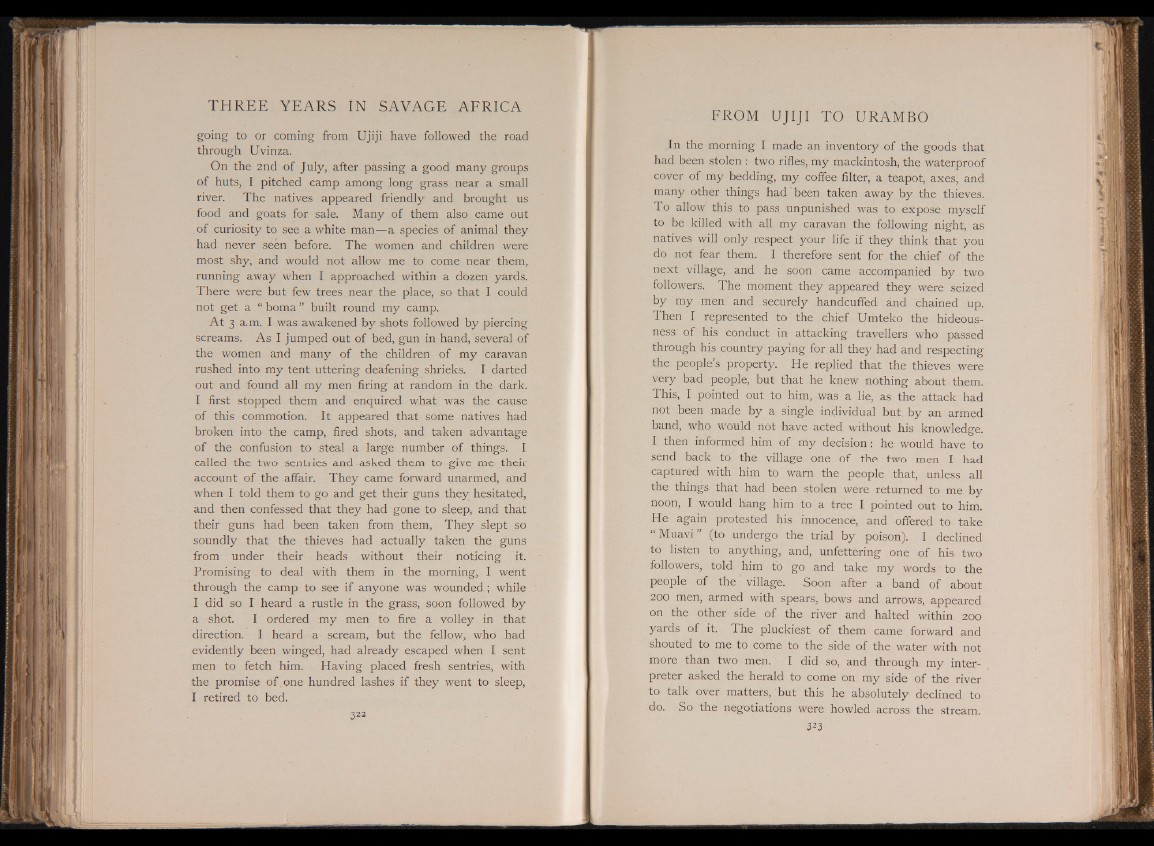
going to or coming from Ujiji have followed the road
through Uvinza.
On the 2nd of July, after passing a good many groups
of huts, I pitched camp among long grass near a small
river. The natives appeared friendly and brought us
food and goats for sale. Many of them also came out
of curiosity to see a white man—a species of animal they
had never seen before. The women and children were
most shy, and would not allow me to come near them,
running away when I approached within a dozen yards.
There were but few trees near the place, so that I could
not get a “ boma” built round my camp.
At 3 a.m. I was awakened by shots followed by piercing
screams. As I jumped out of bed, gun in hand, several of
the women and many of the children of my caravan
rushed into my tent uttering deafening shrieks. I darted
out and found all my men firing at random in the dark.
I first stopped them and enquired what was the cause
of this commotion. It appeared that some natives had
broken into the camp, fired shots, and taken advantage
of the confusion to steal a large number of things. I
called the two sentries and asked them to give me their
account of the affair. They came forward unarmed, and
when I told them to go and get their guns they hesitated,
and then confessed that they had gone to sleep, and that
their guns had been taken from them, They slept so
soundly that the thieves had actually taken the guns
from under their heads without their noticing it.
Promising to deal with them in the morning, I went
through the camp to see if anyone was wounded ; while
I did so I heard a rustle in the grass, soon followed by
a shot I ordered my men to fire a volley in that
direction. I heard a scream, but the fellow, who had
evidently been winged, had already escaped when I sent
men to fetch him. Having placed fresh sentries, with
the promise of one hundred lashes if they went to sleep,
I retired to bed.
In the morning I made an inventory of the goods that
had been stolen : two rifles, my mackintosh, the waterproof
cover of my bedding, my coffee filter, a teapot, axes, and
many other things had been taken away by the thieves.
To allow this to pass unpunished was to expose myself
to be killed with all my caravan the following night, as
natives will only respect your life if they think that you
do not fear them. I therefore sent for the chief of the
next village, and he soon came accompanied by two
followers. The moment they appeared they were seized
by my men and securely handcuffed and chained up.
Then I represented to the chief Umteko the hideousness
of his conduct in attacking travellers who passed
through his country paying for all they had and respecting
the people’s property. He replied that the thieves were
very bad people, but that he knew nothing about them.
This, I pointed out to him, was a lie, as the attack had
not been made by a single individual but by an armed
band, who would not have acted without his knowledge.
I then informed him of my decision: he would have to
send back to the village one of the two men I had
captured with him to warn the people that, unless all
the things that had been stolen were returned to me by
noon, I would hang him to a tree I pointed out to him.
He again protested his innocence, and offered to take
“ Muavi ” (to undergo the trial by poison). I declined
to listen to anything, and, unfettering one of his two
followers, told him to go and take my words to the
people of the' village. Soon after a band of about
200 men, armed with spears, bows and arrows, appeared
on the other side of the river and halted within 200
yards of it. The pluckiest of them came forward and
shouted to me to come to the side of the water with not
more than two men. I did so, and through my interpreter
asked the herald to come on my side of the river
to talk over matters, but this he absolutely declined to
do. So the negotiations were howled across the stream.